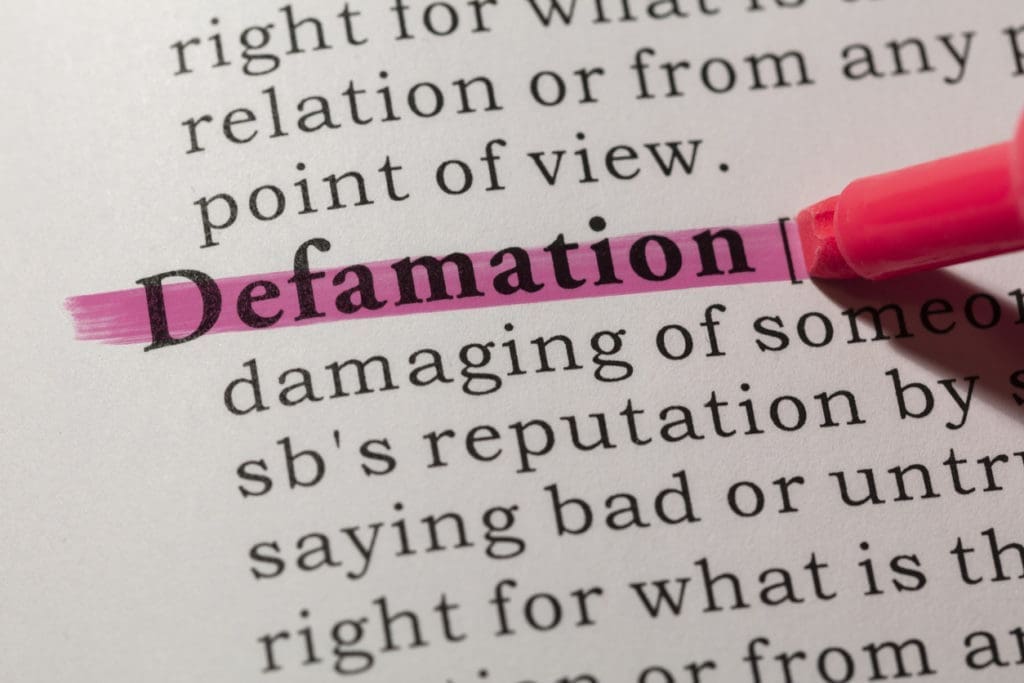Defamation removal can be challenging. With our step-by-step guide, learn how to protect yourself against defamatory statements on the Internet.
How we are perceived online forms the foundation of our digital reputation. In today’s world, people use search engines like Google to learn about the people and places around them. The information that appears in search results can influence behavior.
Have you had intentionally false or misleading content published online about you? If so, you may be the victim of online defamation.
Because your online presence matters, you may wonder how to get this negative content removed once and for all from web search results.
In this guide, we’ll present all the details you need to combat online defamation and the strategies available to you.
Ready to learn about defamation removal options? Complete the form below to get started with a free reputation analysis
How Search Engines and Negative Content can Damage Your Online Reputation
Think about the last time you looked up someone on Google, such as someone you met on an online dating site or a person you were introduced to by a friend.
After typing their name into the Google search bar, what sorts of information did you find in search results?
If the information was positive, chances are you were left with a good first impression.
If the information was negative — or if negative material dominated the rankings on results pages — you are more likely to have a negative impression.
People use the web every day to learn about the world. Information in search results can have a profound effect on the quality and strength of your digital reputation.
Whether you are a business owner, a professional, or an everyday individual, how you are perceived in the digital environment can help you unlock new opportunities — or hold you back from achieving your goals.
Your digital reputation is at risk from defamatory content posted to harm you. Can you afford to let this damaging material keep you from reaching your goals?
What is Online Defamation?
Defamation is a legal term and is defined as:
“The act of communicating false statements about a person that injure the reputation of that person.”
Any false statement that is intended to hurt a person’s reputation can qualify as defamation. This kind of statement is not protected by first amendment rights or freedom of speech claims. In other words, making a knowingly false statement may not withstand legal claims filed by someone who is the victim of online defamation.
Defamation can take several forms, both verbally, in written communication, and online. It is the online defamation that our guide addresses, although any form of defamation can hurt your reputation online.
Internet defamation is widespread and even harder to combat. As such, it is a growing public concern.
On the web, an anonymous person — the person defaming another individual — may post negative material with just a few clicks of a mouse. Content published with the intent to defame a private figure can appear on social media accounts, blog post, online chat rooms and forums, and numerous other websites where user-generated content is available.
An anonymous user’s identity may shield them from direct legal remedies, but that doesn’t stop you from filing a defamation claim if you are the victim of harmful content posted online to damage your reputation.
Defamatory Statements: Slander vs. Libel
Whether online, in print, or by word of mouth, the concepts of defamation can be confusing. The terms “defamation,” “slander,” and “libel” are often used interchangeably, yet each has its own definition.
To clarify, let’s take a deeper look at slander vs. libel:
Slander
Slander is defined as an oral defamatory statement.
- Spreading a false statement or rumor about someone’s health status
- Making harmful oral statements about a person’s business dealings or personal activities
- Falsely accusing someone of an inappropriate or criminal act.
In the past, courts hearing defamation lawsuits often treated the two terms differently, arguing that because defamation in print has the potential to be more damaging over the long term, libel cases were treated more seriously.
Today, many courts agree that the two terms, although differing in their definition, have the same reputation-damaging potential.
Libel
A libelous statement is any defamatory statement that is made in written form. This applies to a written letter, online post, printed statement, or other written content.
Examples of libelous statements include:
- A Google review that falsely claims a business engaged in unsafe or scandalous behavior
- A social media post that starts a false rumor about someone’s physical or mental health
- A letter to the editor of a newspaper that falsely accuses someone of a crime or inappropriate behavior
With the above-mentioned considerations in mind, have you been the victim of defamation? Have you considered a defamation lawsuit? If you have, read on for more details about what you can do to get content removed from the web.
That’s Not Defamation!
Now that we have learned about online defamation and the different kinds of defamatory content, it’s time to discuss what is NOT defamation.
Say a former employee posted something negative about your company on social media sites, or perhaps a customer posted a negative Google review. These statements aren’t necessarily defamation; they may simply be people sharing their negative experiences with others.
In other words, just because someone lodges business complaints or posts an unflattering Google review does not mean that they are trying to defame you.
To be defamatory, the content must be false and posted with the express intent to harm one’s reputation or business. Negative reviews don’t qualify unless they were meant to be defamatory, misleading, or are shown to be false.
Protection by the Communications Decency Act
In 1996, the U.S. Congress enacted the Communications Decency Act (DCA) into law. The DCA is part of Title V of the Telecommunications Act of 1996.
It was the government’s first attempt to regulate sensitive material on the web, particularly pornography.
In the early days of the internet, a growing problem with content published and hosted without a person’s consent caused the federal government to step in.
Attorneys with experience in content removal may use the Act as a basis for a strategic lawsuit; this and other legal strategies are effective in getting negative material off the web and out of Google’s search results.
Removing Defamatory Content from Google Search Results
If you or someone you love has been defamed in the digital environment, you may be able to have Google remove the defamatory material.
Unfortunately, Google has specific policies that govern negative content removal — in other words, just because you don’t like what someone else says about you doesn’t mean it can be automatically removed from search results.
Google’s content removal policy requires at least one of the following criteria to be met in a content removal request:
- The request is for removal of content that contains personally identifiable information which may put a person at risk of harm.
- The posted content is explicit in nature, such as revenge porn, pornographic content posted without consent.
- Inappropriate content violates a specific law or terms of service, such as Google’s terms of service or the Digital Millennium Copyright Act (DMCA). In this case, Google may need a court order or similar legal documentation to honor a request for removing content.
- Negative content appearing in search results contains proprietary information, such as intellectual property or sensitive business secrets, that can damage a company’s prospective business relations.
Google’s content removal policy is strict. Therefore, it should be considered as a last-resort option when all other strategies have been exhausted.
We’ll present additional content removal strategies in the sections below.
Your Content Removal Strategy: Four Options
Need content removed from Google’s search or websites hosting defamatory content? Here are four additional options:
Request content removal from web page owners
Your first strategy when it comes to removing negative material from the web is to reach out to webmasters.
A well-written letter can make all the difference when it comes to convincing someone to voluntarily remove negative material from their website. In the letter, state your case clearly, such as that private information was posted or content made or published without your consent is putting you at risk.
To find out who owns the website hosting the content, you can use the ICANN registration data lookup tool. This way, you can quickly direct a request for removal.
Be advised that asking a webmaster to remove content may not always work. In fact, without a court order, many webmasters are reluctant to remove offending materials, arguing that this act would infringe on free speech.
Contact internet service providers about defamatory content removal
In cases where webmasters or site owners will not remove defamatory content, your next step is to request defamation removal from internet service providers (ISPs). Many ISPs have policies designed to prevent the hosting or sharing of internet defamation.
Under specific circumstances, ISPs may direct sites hosted by them to remove online defamation — including third-party content — or lose access to their servers. In some cases, ISPs may secure a court order or file a DMCA takedown notice with the site owner to get them to comply.
If you can prove that a violation of the site’s terms of service agreement has been made, you have a good chance of getting content removed.
Hire an experienced content removal attorney
It is important to understand that the defamatory information or other damaging content removal strategies above may not always work. In those cases, hiring an internet defamation attorney is the next option.
Internet defamation lawyers have the tools and experience needed to represent clients in a defamation lawsuit. One of the tactics these lawyers use is to file claims under the CDA, which was written to protect individuals from the damage associated with internet defamation.
By taking legal action, individuals and business owners can leverage defamation law to their advantage.
A defamation claim, backed by a court order, has a strong chance of success. An experienced attorney and your legal team can succeed in defamation removal where others fail. In some cases, this is the only option available when infringing material has been shared online, and no other strategy has worked to remove it.
Without a court order, you may have significant challenges ahead when you want removal of defamatory materials. Your attorney can advise you of your best options.
Your defamation case may take time, and despite the legal protections you have with defamation removal case law, this method is not always successful.
It is also important to point out that a strategic lawsuit can be expensive; you may incur significant legal fees, especially if a thorough online search turns up negative content on multiple sites.
Remove negative content with online reputation management services
Even one negative online image posted by a former employee or someone with an axe to grind can damage your reputation, potentially hurting your business or standing in the way of your goals. In some cases, these individuals will use intentional interference to hurt your business prospects by flooding the web with negative and unflattering content.
Online reputation management (ORM) services can help you restore your good name.
ORM professionals use a wide array of tactics to get content removed. This can include legal claims, working with website owners, filing takedown requests, and other strategies.
If content cannot be removed, it can be suppressed. This process requires the development and publication of positive content, search engine optimization, and internet promotion. By flooding the web with new content, negative search engine results are pushed down — sometimes off the first page of results entirely.
Content can be published to your company or personal website, social media accounts, blogs, and industry forums, only to name a few of the many places where fresh content can be hosted.
Contact NetReputation Today
NetReputation is an award-winning leader in online reputation management. We have helped thousands of people establish, build, or repair their reputations in the digital environment. Defamation can damage your reputation, potentially keeping you from achieving your goals.
Learn more about our reputation management services, including defamation removal solutions to keep your reputation safe by contacting our content removal professionals today. We assist clients by removing defamatory statements from internet sites and Google’s search results with proven strategies.
Call NetReputation at 844-461-3632 or complete the online form below for a free consultation.


